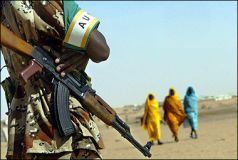Darfur security improved, but fear still reigns: UN
KHARTOUM, July 13 (AFP) — Security has improved in some parts of Sudan’s troubled Darfur region but fear continues to reign among internally displaced persons, a UN official said.

|
|
Displaced women walk in front of a Rwandan soldier at Abushouk camp near El Fasher in North Darfur, Nov. 3, 2004. (AFP). |
“The situation has improved largely because of the presence of AU monitors and in some places there have been police stations set up in critical areas,” George Somerwill, deputy spokesperson for UN envoy Jan Pronk, said.
“This has improved the situation but nevertheless, there is still a tremendous amount of fear on the part of all IDPs, especially the women,” he told a press briefing.
He said people “are very, very afraid of what might happen to them if they go out of the camp.”
In order to help dispel this fear, he said: “Small steps have been taken and are being taken, like firewood patrols in which women, when they go out in search of firewood, are accompanied by AU forces or by government police and in some cases, by both.”
However, he added: “The situation still needs to improve because the people are still very, very afraid of the activities of the militias, afraid of the activities of the bandits… there is a lot of banditry going on in Darfur.
“As long as there is a high level of fear we have to ask, ‘What are the people afraid of?’ And when we speak to the women of Darfur in IDP camps, many of them will say that the biggest fear they have is fear of rape.”
Somerwill stressed that the Sudanese government is responsible for the security of the Sudanese people “no matter where they are”, adding: “The government knows that it is responsible for looking after the security of all Sudanese citizens.”
Fighting has raged in Darfur since February 2003, when local groups launched a rebellion in the name of the region’s black tribes against marginalization by Khartoum’s Arab-dominated government.
The Darfur conflict has claimed between 180,000 and 300,000 lives, with some 2.4 million civilians displaced from their homes, while an additional 200,000 have fled into neighboring Chad.
Somerwill said the UN role would be to continue discussing the situation with the government.
“We will also monitor the situation and we have human rights monitors on the ground in Darfur,” Somerwill said.
